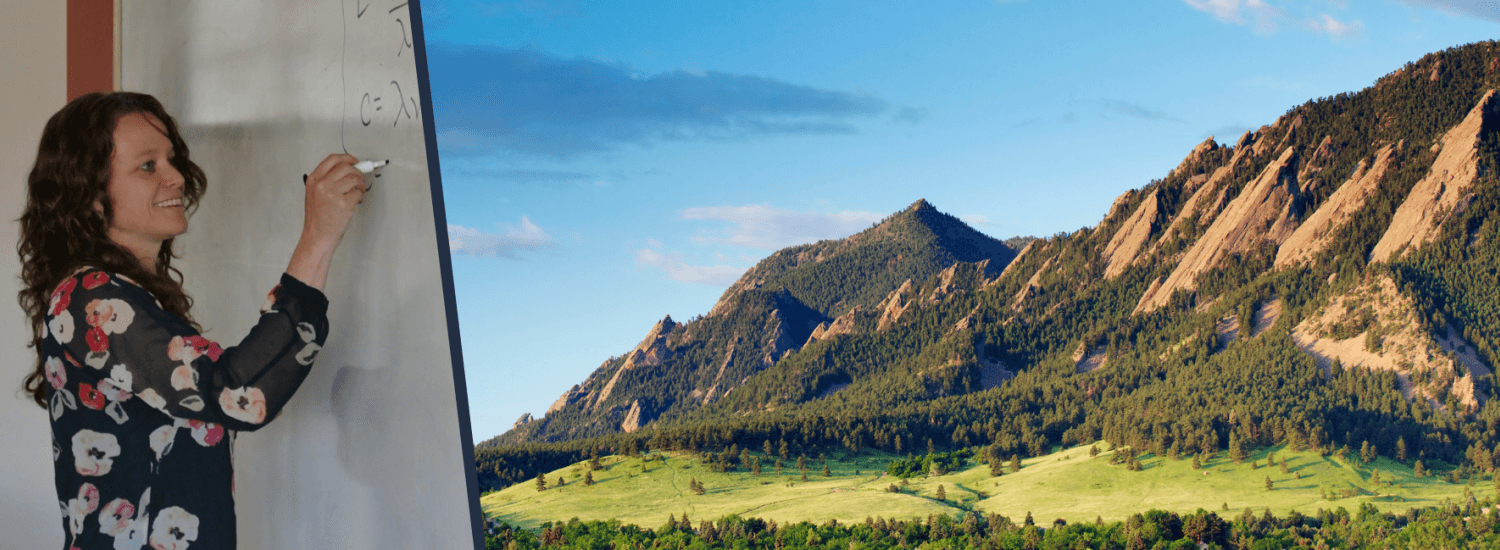Becca Edwards joins CIRES as director of diversity, equity, and inclusion
The DEI professional brings a background in science and inclusive teaching

CIRES is excited to welcome Becca Edwards (formerly Ciancanelli) as the new CIRES director of diversity, equity, and inclusion. Edwards comes to the position with deep roots at CU Boulder coupled with decades of experience in science and inclusive teaching. Most recently, she served as director of inclusive teaching practices at the University of Denver.
“Becca has amazing experience and knowledge of the campus community, and she will be a leader, continuing to build our DEI efforts across the Institute and supporting the University and the broader scientific community,” said Christine Wiedinmyer, CIRES associate director for science.
Wiedinmyer is excited to partner with Edwards to continue to develop the CIRES DEI program that began in 2017. The institute recently outlined DEI goals and values in its strategic plan, which created a roadmap to providing resources and training, committing to building a diverse workforce, and addressing diverse science needs.
With an undergraduate degree in chemistry and a master's degree in teaching, Edwards began her career teaching high school science. During the summers, she maintained a connection to scientific research by participating in a summer fellowship for teachers at the National Renewable Energy Laboratory (NREL) in Boulder.
"I chose to be a teacher because of my desire to be in a service role and make a positive societal impact,” said Edwards. “The program at NREL allowed me to do hands-on renewable energy research, which was the first time that I could see a direct connection between chemistry and my values around societal impact.”
The summers at NREL inspired Edwards to pursue a Ph.D. in inorganic chemistry at CU Boulder. But after a handful of years in a lab, she realized she wanted her work to connect with people, and she soon found this balance in a position at CU Boulder’s Student Academic Success Center (SASC). As an academic specialist, she taught first-year courses to low-income, first-generation, and underrepresented students.
Edwards continued to create cutting-edge curricula and methods for teaching underrepresented students, founding the first STEM program at SASC, and then designing and presenting inclusive teaching practices for faculty at the Center for Teaching & Learning. This breadth of work helped Edwards discover her path as a DEI practitioner.
“In DEI work, it's really important that you are committed to a journey of self-awareness, understanding your positionality and the ways in which your lived experiences impact how you see the world,” said Edwards. “I feel grateful that I had several years of working with hundreds of SASC students from so many different backgrounds which allowed me to build my self-awareness.”
Now, Edwards is excited about her next steps – a DEI position that allows her to combine her passion for DEI with impactful scientific research at CIRES. She’s excited to utilize her familiarity and connections with the many DEI initiatives on CU’s campus.
"There are amazing resources on the CU Boulder campus that I have connected with over the years, " Edwards said. "Two examples are the Pride Office run by Morgan Seamont and the Center for African and African American Studies run by Reiland Rabaka. Their events and newsletters help people feel connected in a holistic way to their working environment.
Edwards starts August 21, and she plans to hit the ground running. Her first steps include visiting labs and getting to know researchers, scientists, and staff. Her goal is to learn and understand where each CIRES unit stands in its DEI process, and she can support the next steps in creating inclusive research environments.
A few weeks ago, Edwards attended an EPA webinar about a grant opportunity focused on creating a regional technical assistance center to help communities tackle environmental justice concerns. Having the opportunity to dig in solidified her excitement for her new role.
“I love the way that CIRES is doing the critical research and wanting to support communities that are disproportionately impacted by environmental risks,” Edwards said. “That's definitely what I was drawn to right away from the job posting — supporting the external impacts of the research is really exciting for me.”